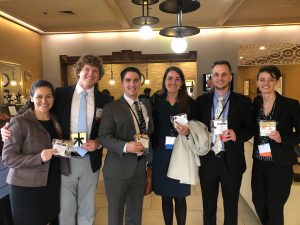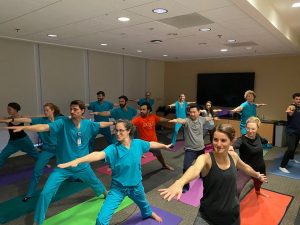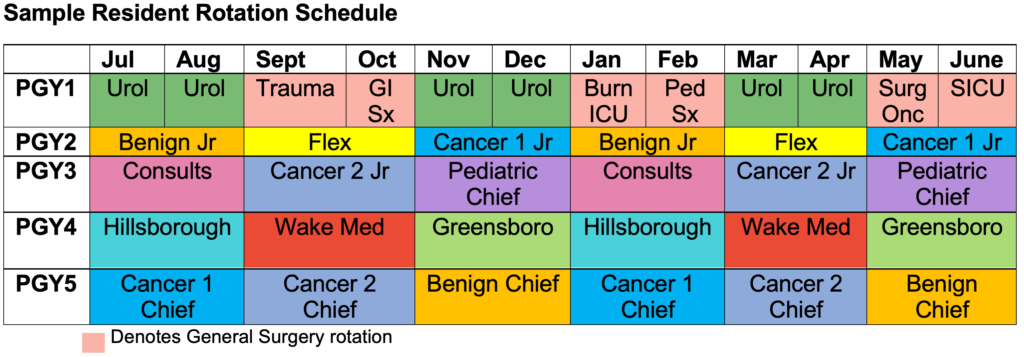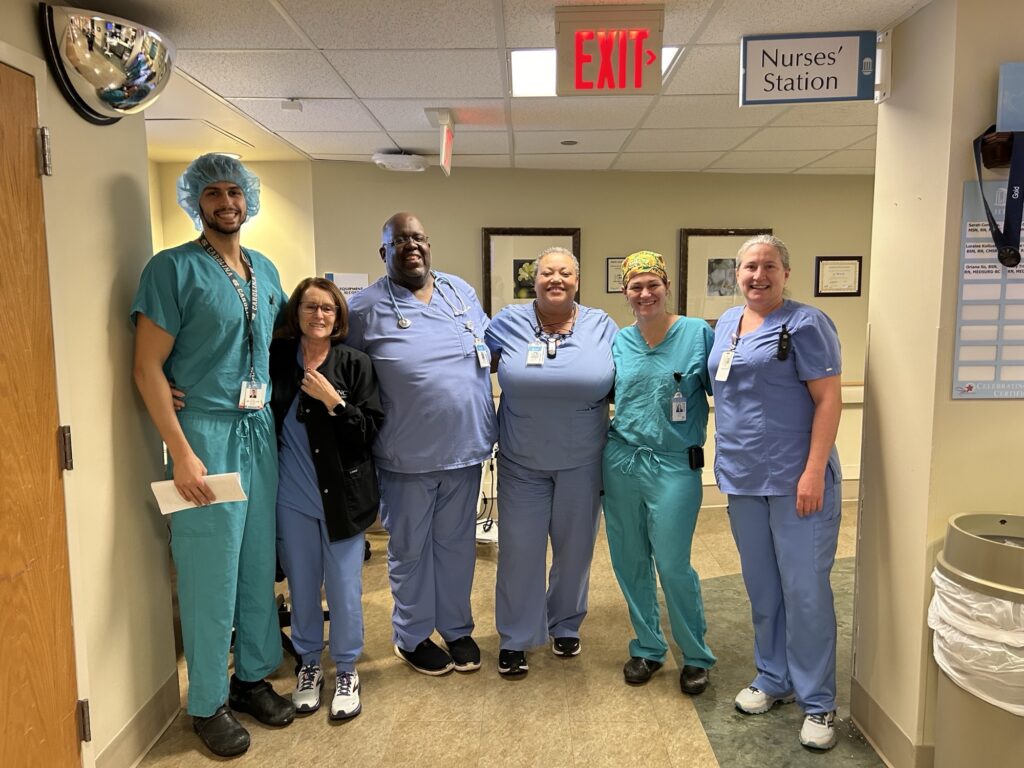
Program Overview
Introduction
Page Contents
The Department of Urology training program received a rating of Continued Full Accreditation following its latest accreditation review in 2011. The program is approved to increase the number of residents in our five-year program from 15 to a total of 20. Our program will be increasing the resident compliment from three to four residents per year starting with the 2026/2027 academic year.
Program Objectives
Our goal at UNC Urology is to prepare graduates for fulfilling and rewarding careers in all areas of urology, across the spectrum of practice settings. Our alumni have been successful in obtaining competitive subspecialty fellowships, where desired, and have gone on to be leaders in a variety of practice settings, including full-time academic faculty, hybrid academic/private practice faculty, and community-based private practice.
Hear From Alumni & How UNC Set Them UpThe Urology Residency Training Program at UNC encompasses training in the fundamental principles of infertility, calculus disease, female urology, oncology, pediatrics, reconstruction, sexual dysfunction, and voiding dysfunction. In addition, provide instruction in urologic techniques of endourology, major flank and pelvic surgery, microsurgery, minimally invasive intra-abdominal and pelvic surgical techniques, and urologic imaging. Residents will also have clinical interaction with experts in geriatrics, infectious disease, interventional radiology, medical oncology, radiation oncology, radiology, renal transplantation, renovascular disease, plastic surgery, and trauma.
The faculty works closely with the residents and medical students in all clinical settings, including the operating rooms, clinics, and inpatient & outpatient facilities.
Faculty
The UNC Urology faculty includes fifteen ABU-certified urologists and two other faculty members that vary in stages of certification. All are actively involved in clinical care, teaching, and/or research. In addition to mentoring residents, faculty members are also involved in education and training programs for medical students. They have ongoing research programs, hold leadership positions in various national entities, and make regular contributions to scientific conferences at the local, regional, national, and international levels. In addition to the core faculty, residents may interact with twenty-eight other urology clinical faculty members located on the main campus or the offsite rotations.
As an intern we will help identify a Faculty Mentor. Throughout your residency, you will have the opportunity to meet 1-on-1 with your mentor to help navigate residency decisions such as fellowship vs. private practice, major life decisions and events, etc.
Mentorship meetings are encouraged to take place outside of the hospital and many choose to meet on the golf course, over lunch, or even just while grabbing some ice cream.
Hear What Faculty Say About Our Residents
Education
 In addition to clinical training, residents participate in regular conferences, including grand rounds, journal club, morbidity and mortality, pathology, AUA Core Curriculum review, and AUA guidelines review.
In addition to clinical training, residents participate in regular conferences, including grand rounds, journal club, morbidity and mortality, pathology, AUA Core Curriculum review, and AUA guidelines review.
Beyond the training, education, and mentoring support our residents receive support so they can attend several conferences and training sessions at regional and national gatherings. Some of these include:
- American Urological Association Annual Meeting
- Southeastern Section of the AUA Annual Meeting
- Southeastern Section of the AUA Robotics Course
- American College of Surgeons Clinical Congress
- Society of Urologic Oncology Annual Meeting
- National Urology Resident Preceptorship in Adult and Pediatric Reconstructive and Prosthetic Urologic Surgery
- Society of Urodynamics, Female Pelvic Medicine & Urogenital Reconstruction Preceptorship Program
- AUA Basic Sciences Course (PGY3)
- AUA Annual Review Course (PGY5)
Weekly Resident Conferences
| Monday | Tuesday | Wednesday | Thursday | Friday | |
|---|---|---|---|---|---|
| AM | AUA Guidelines (6:30 am) |
Grand Rounds, M&M, Journal Club, Guest Lecture (7:15 am) |
Faculty / Chief Didactic (6:30 am) |
||
| PM | GU Path Rads (1:30 pm monthly) |
GU Onc Tumor Board (1:15 pm) Indications Conference (Last Thurs of month, 4:30 pm) |
Outside Urology Conferences
| Conference | Resident Year | Month |
|---|---|---|
| AUA | PGY4 | May |
| Board Review Course |
PGY5 | |
| Residents are supported to attend other conferences in which they have accepted presentations / abstracts such as SESAUA, ACS, SUO | ||
Rotation Schedule
Sample Resident Rotation Schedule
PGY 1
Residents are members of the Department of Urology and spend 6 months on the urology service during their intern year. The remaining 6 months are spent working with the department of surgery. PGY1 residents rotate through one-month rotations with the Department of Surgery in the areas of Critical Care, Surgical Oncology, Lower GI Surgery, Burn Surgery, Pediatric Surgery, and General Surgery at WakeMed, a private hospital in Raleigh.
PGY 2
Residents continue their training within the department of Urology full time at UNC Health Care. They spend focused time in general urology and developing endoscopic and ultrasound skills.
Junior Resident Research
Resident research rotation has transitioned from dedicated time within a 4-month period during the PGY2 year to 1 day per week (postcall week day) over the PGY2 and 3 year period
PGY 3

PGY 4
Residents spend the year off-campus. They rotate for 4 months with Alliance Urology, a multispecialty private practice group in Greensboro NC, 4 months at WakeMed, a hospital-employed urology group in Raleigh NC, and are the chief of the urology service at UNC Hillsborough, a community hospital 12 miles from the main campus. In-depth reconstructive urology training is a particular focus at UNC Hillsborough.
Residents in the 4th and 5th year also have the opportunity to pursue an international elective with the UNC Malawi Surgical Initiative by participating in urologic care at the Kamuzu Central Hospital (KCH) and the Bwaila Fistula Care Center.
PGY 5
Chief resident year at UNC Health Care. The chief residents run the benign and oncology services, act as the primary surgeon for major cases, and as teaching surgeons for minor cases with junior residents. They direct management for inpatient and outpatient care and work with an increasing degree of independence throughout the year as they prepare for the transition to fellowship or independent practice.
Call Schedule
| Weekday Frequency | Weekend Frequency (F-Su) | Notes | |
|---|---|---|---|
| Junior Call (PGY 2/3) |
Once Weekly | Every 6th weekend | Home call, 1st call for consults / ED, backup for in-house intern for floor patients at UNC; Hillsborough covered by phone or transfer to UNC main |
| Senior Call (PGY 4/5) |
Every 3rd week | Every 4th weekend | Supervise junior resident, intraop consults, emergencies at UNC; primary call at Wake Med / Greensboro |
Resident Wellness
Parental Leave
*The comprehensive GME Leave Policy can be found here with an abbreviated summary below:
- Trainees may be eligible for up to 12 weeks of continuous parental leave, broken down as follows:
- Trainees may take up to 4 consecutive weeks of GME Paid Parental Leave per 12 month period
- A trainee who takes 4 weeks of GME Paid Parental Leave and is eligible for Serious Medical Illness Leave may be approved for up to an additional 8 weeks, providing eligible trainees with up to 12 weeks’ total continuous leave
- A trainee is still eligible for GME Paid Parental Leave even if Family Medical Leave has been exhausted for the a 12 month period
Benefits and insurance continue as prior to the Leave
Lactation Policy
*The comprehensive UNC Department of Urology Policy on Lactating Urologic Surgery Residents with an abbreviated summary below:
- The Department of Urology is committed to protecting the health of all residents and recognize the specific needs of new mothers
- The department commits to upholding, distributing, and posting the “Guideline for Wellness of Lactating Urology Residents”
- Lactating Residents will provide advanced notice to the Program Director, attending surgeons and residents on service regarding specific needs for lactation
- Lactating Resident will be allowed to leave clinic to pump at reasonable intervals and appropriate locations
- Resident responsible for consults will take appropriate breaks for lactation with notification of an alternate resident to cover urgent/emergent consults
- Lactating Resident will notify attending surgeons on each service that they will require lactation breaks during procedures, and team-based planning will minimize interruptions to the operating team while addressing needs of Lactating Resident
- Lactating Resident are allowed to leave or be late for mandatory teaching conferences for pumping when necessary (or may choose to pump during conference if they desire)
Burnout Prevention
Identifying Burnout
 The residents and the program director have monthly conferences to discuss residency issues including burnout and to re-iterate resources for preventing and treating burn out. Additionally, the program director meets individually with each resident semi-annually.
The residents and the program director have monthly conferences to discuss residency issues including burnout and to re-iterate resources for preventing and treating burn out. Additionally, the program director meets individually with each resident semi-annually.
Burnout Treatment: Taking Care of Our Own
Recognizing that our physicians at UNC may need help from time to time to cope with the challenges of their professional journey, Dr. Samantha Meltzer-Brody, with the generous support of the Sanders Clinical Scholars Program, began a program called “Taking Care of Our Own.” This program provides education, confidential support, advice, and if needed, appropriate professional referral for individual mental or physical help that meets your needs. Read more on the Taking Care of Our Own site.
- Confidential psychiatry and therapy
- Specifically for residents
- Covered by insurance
- Incredible support
- Many residents take advantage
Mindfulness
Advisory Center for Health Professionals
Other Resources
UNC Health Mental Health/Emotional Support Resources for Co-workers and Providers
Resident Salary
Effective 7.1.2024
| Resident Year | Salary |
|---|---|
| PGY1 | $61,553 |
| PGY2 | $63,749 |
| PGY3 | $66,056 |
| PGY4 | $69,169 |
| PGY5 | $72,238 |


